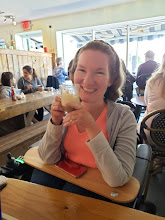I have really enjoyed re-reading Lewis Carroll's classics, Alice's Adventures in Wonderland and Through the Looking Glass this week. I know I've said this before, but it's a good idea sometimes to read "children's literature" again as an adult (sometimes I try to convince myself that I am an adult), because the authors themselves are adults and can't help but attach some adult significance to even the most child-like stories. What we read as children may have seemed purely entertaining, imaginative, and even nonsensical... but as we grow up, we learn about the literary art of metaphors and symbolism, and we see more sense and purpose in the same old stories. In the Alice books, I've noticed there are some themes that relate to growing up... the first theme is that of Identity:
"Who are you?" the contemptible caterpillar asks.
After changing sizes so many times in a day, Alice wonders to herself: "But if I'm not the same, the next question is, who in the world am I? Ah, that's the great puzzle!"
The Dutchess, full of morals, tells Alice to simply: "Never imagine yourself not to be otherwise than what it might appear to others that what you were or might have been was not otherwise than what you had been would have appeared to them to be otherwise."
And the Red Queen's wise instruction is: "Speak in French when you can't think of the English for a thing - turn out your toes as you walk - and remember who you are!"
We all go through times in our lives when we consider the changes we've been through and wonder if we are the same person we used to be. We question our identity and fear it may have gotten lost somewhere along the way... and the more we focus on "me," the less aware we are of Who created us and Whose we were meant to be in the first place. I've seen people make foolish decisions and dangerous life choices for the sake of forming their own identity. If we define ourselves by human standards, we will never be content or secure. And yet, this theme of identity is so important in forming how we relate to God, each other and the world! Maybe that is why another Book had so much to say about it as well...
Throughout the Old Testament, God changes people's names: Abram becomes Abraham, Sarai becomes Sarah, Jacob becomes Israel, and so on... all for the purpose of changing their identity. When they experience encounters with God, they are not who they were before - they cannot be the same, and so he gives them a new identity altogether. "No longer will you be... now you will be..." He even changes the identity of a whole nation:
Isaiah 62:4: "No longer will they call you Deserted, or name your land Desolate. But you will be called Hephzibah, and your land Beulah; for the LORD will take delight in you, and your land will be married."
In the New Testament, God continues to call his people to a new identity. The book of Ephesians is full of this theme! Those who have encountered and received and surrendered to Christ now find their whole identity in Christ - a new self that replaces the old self. We are sons of God (1:4-5), workmanship with a purpose (2:10), citizens and dwelling places (2:19-22), heirs, members, and sharers (3:6), a completely new self that looks like God (4:20-22), children of light (5:8-10), and even soldiers (6:11).
The more I study the Bible, the more I find my identity in Christ, and therefore the less I feel the need to "find myself." John the Baptist was so consumed - even obsessed - with who Jesus was that he denied himself completely as anything other than a voice - and even that voice existed for the sole purpose of preparing the way for Jesus. Why try to find yourself once you've found Jesus? As his follower and child, I have a position and a purpose, a relationship and a reason, a mission and the equipment I need to accomplish it. I am His - what else matters?
"Who are you?" the caterpillar asked Alice, and she didn't know. Do you?
Wednesday, March 17, 2010
Subscribe to:
Post Comments (Atom)





No comments:
Post a Comment